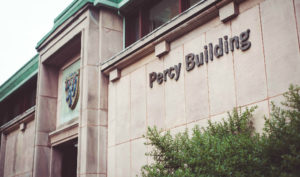There’s a very famous, perhaps apocryphal phrase, uttered either by Louis XV or Madame de Pompadour. It goes something like:
Après moi, le déluge.
The literal meaning of this is: ‘after me, the deluge’ or (and I prefer this biblical inflection) ‘after me, the Flood’. What Madame de Pompadour or Louis XV actually meant, however, is that they felt some kind of catastrophe would follow them, and, on top of that, that they wouldn’t be around to suffer the consequences. In other words, the phrase is a statement of indifference to what will not directly concern you.
There’s actually another, similar, phrase in French: ‘avant le déluge’ (‘before the flood’), which uses antediluvian language to express the historical remoteness of an event. I pick up on this phrase, and its more famous partner, because both of them express a subjective view of time, and that, dear reader, is what this blogpost is about.
When I started my job at Newcastle I was exceptionally ignorant. Coming straight from a PhD to a lectureship was a stroke of good fortune who absurd serendipity still bothers me today, and one of its odd side-effects was that I had no experience of university life as a teaching fellow or postdoctoral researcher, as – in other words – someone who (unjustly) is so often both and not part of departmental life and so, for better or worse, someone with an opportunity to see how a department works, to hear the rumours and to learn the codes.

I knew little about Newcastle University before applying, and only a little more when I started working here. What I did know largely concerned the outward face of the university: its research, its strategy, its public history, and so on. I knew nothing about the immediate history of my department, about modules that had run in the past, about who had previously held a position, or even about who had been in my office. It was as if, prior to my arrival, there had been a great flood, sweeping away – from my point of view – the immediate history of the place, and giving me a blank slate to work upon, a mirror image of the cipher that I must have been to my new colleagues.
I joked at the time that I measured things in BJ and AJ (Before and After James), and this explained my many faux pas. Yet I slowly discovered that my solipsistic view of things wasn’t so unusual: there was some common history that most of those around me knew, but there were still gaps. The university has a very strange kind of institutional memory, which relies as much on long-serving and garrulous staff as it does on a haphazard archive. Things are further complicated by the students: after the 2017-18 academic year, there will be no more students on campus who remember a time before I joined Newcastle. As far as any undergraduate knows, I’ll have been here since the beginning of time, haloed with the same aura of permanence as those whose careers at Newcastle stretch a decade further than my own.
Equally, those new students, and indeed new colleagues, will not know the staff and students I have known, just as I do not know many others. I don’t know why this bothers me so much, but, like Louis XV (or Pompadour) I have an emotional relationship with institutional time, and have done two little things to change its functioning.
- The first is to discover who used my office before I did. I can now trace its owners back to installation of English Literature on the second-floor of the Percy Building. Room 2.13 has belonged to: Gordan McMullan, Jennifer Richards, Shehzana Mamujee, and me.
- The second is to keep a record of every visiting speaker and those who attended his or her talk. This is done in a nice, blank book I bought, and with many reassurances that I’m not taking attendance. I’d take a picture of that book, but it now sits in the office of the new convenor of the visiting speaker series.
These are small things, I admit, but they are important to me. Over the last three years, I’ve slowly learnt more of the immediate (and more distant) history of my department, and am, I hope, a better colleague for that. There’s more to say, not least about the ways in which the strange functioning of a university’s memory through time is a virtue, but I think I’ll need to spend a few more years in a department before I’m ready to do that.